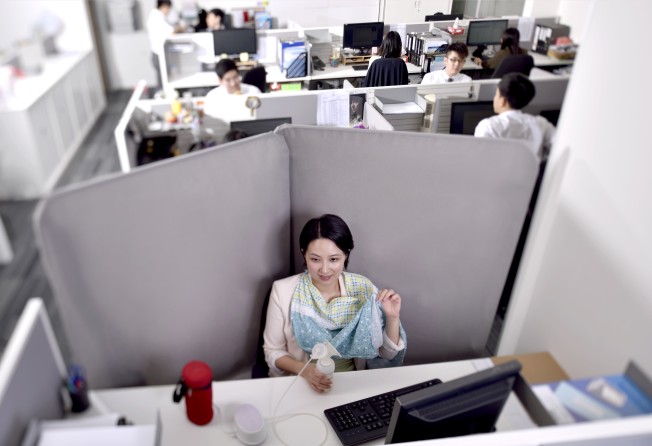Hong Kong and the Battle to Breastfeed
Inaction from the government and a lack of community support are stopping the city's women from feeding their babies in public.

Goldie Chiang is a stay-at-home mother who’s been breastfeeding her son for just over one year. Not long ago, she was working at a social welfare organization that allowed its employees sufficient time to pump breast milk. But there was one major problem—Chiang says that while a spare room was available in the beginning, it was later converted into an office to make room for new staff.
“There were two meeting rooms that I could’ve booked for pumping milk, but they were often occupied and I didn’t want to trouble anyone, so I ended up pumping in the toilet,” Chiang says. At that time, she pumped milk once every four hours.
“It’s unsanitary, but still better than having no place to pump milk at all,” laments Chiang.
Not every mother here has Chiang’s persistence. The World Health Organization recommends that infants are breastfed exclusively for the first six months for optimal health. But according to a 2010 study published in BMC Pregnancy and Childbirth, returning to work is the main reason more than half of Hong Kong mothers stop breastfeeding in the first three months after delivery.
Read More: Forget Maternity Leave, Hong Kong Calls on Grandparents for Childcare
Mothers in Hong Kong are entitled to 10 weeks of paid maternity leave—four weeks short of the International Labour Organization's recommendation—while fathers have a paltry three days of paternity leave. Neighboring Singapore provides 16 weeks of fully-paid maternity leave, and up to three weeks of paid paternity leave. Depending on certain circumstances, such as the number of children the mother has had, both maternity and paternity leaves are partially, or sometimes even wholly government-funded in Singapore.
Sharon Tsui Ying, co-founder of the Natural Parenting Network, says the government has a long way to go in creating an environment that is conducive to breastfeeding in public. “Hong Kong has no legislation whatsoever to protect breastfeeding, unlike, for example, Taiwan,” she says.
In 2010, Taiwan’s Legislative Yuan passed the Act Governing Breastfeeding in Public Places, which says that anyone who tries to stop a woman from breastfeeding in public or asks that she leave a specific area to do so will face a fine of between about $1400 and about $7100. Taiwan requires that most public places provide breastfeeding rooms, or otherwise face a maximum fine of about $7100.
Six years later, we’re still waiting for action from the Hong Kong government. It has yet to implement legislation that encourages breastfeeding. Tsui believes that it is necessary to protect breastfeeding, by, for example, reducing the influence that formula milk advertisements have on new mothers. The Hong Kong Infant and Young Child Nutrition Association, which was founded by major formula milk manufacturers, currently limits the scope of marketing materials for formula milk products to those for babies aged six months and above.
“Formula milk manufacturers still advertise other products, such as formulas for toddlers, and those for expectant mothers,” Tsui says. “This still sends a message to the average consumer that formula milk products are essential from birth.”
The government set up a task force in 2010 to examine implementing a voluntary code that prohibits the advertising of formula milk products for children aged up to 36 months. In 2012, it conducted a public consultation and the results were later presented to the Legislative Council in 2014, but no further progress has been announced.
At the grassroots level, UNICEF Hong Kong says that the lack of community support is a major obstacle to mothers who want to breastfeed. UNICEF advocate Kitty Chan Kit-chi says mothers are 2.5 times more likely to breastfeed when there are combined supportive measures in hospitals and the community.
Cantopop star Ella Koon, who was criticized for breastfeeding in a changing room just this month, has jumped on board a UNICEF campaign to support mothers, along with 60 corporations both small and major.
And while four of the city’s major public hospitals—Queen Elizabeth Hospital, Kwong Wah Hospital, Queen Mary Hospital and Prince of Wales Hospital—have pledged to become baby-friendly, none of them have completed an official accreditation process, which was created all the way back in 1991. To date, Hong Kong has no baby-friendly hospitals that meet this global standard.
After birth, many Chinese mothers recover for one month during a confinement period. Certified post-natal care helper Noel Leung says that the government’s materials for nannies to aid these new mothers on lactation during this period barely scratch the surface. “They don’t teach you things like how to boost milk production,” Leung says, adding that post-natal care helpers often find it easier to rely on formula for feeding.